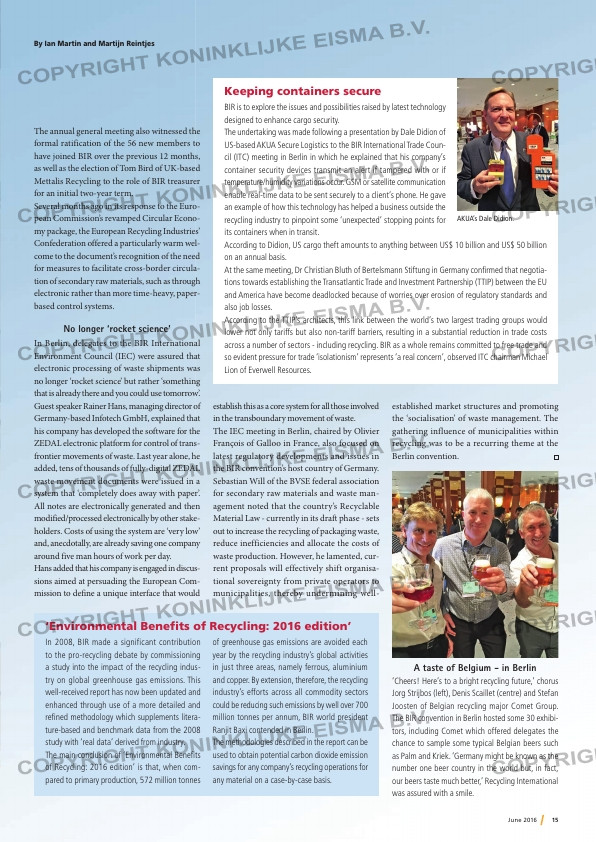Page 15 from: June / July 2016

15June 2016
By Ian Martin and Martijn Reintjes
The annual general meeting also witnessed the
formal ratification of the 56 new members to
have joined BIR over the previous 12 months,
as well as the election of Tom Bird of UK-based
Mettalis Recycling to the role of BIR treasurer
for an initial two-year term.
Several months ago in its response to the Euro-
pean Commission’s revamped Circular Econo-
my package, the European Recycling Industries’
Confederation offered a particularly warm wel-
come to the document’s recognition of the need
for measures to facilitate cross-border circula-
tion of secondary raw materials, such as through
electronic rather than more time-heavy, paper-
based control systems.
No longer ‘rocket science’
In Berlin, delegates to the BIR International
Environment Council (IEC) were assured that
electronic processing of waste shipments was
no longer ‘rocket science’ but rather ‘something
that is already there and you could use tomorrow’.
Guest speaker Rainer Hans, managing director of
Germany-based Infotech GmbH, explained that
his company has developed the software for the
ZEDAL electronic platform for control of trans-
frontier movements of waste. Last year alone, he
added, tens of thousands of fully-digital ZEDAL
waste movement documents were issued in a
system that ‘completely does away with paper’.
All notes are electronically generated and then
modified/processed electronically by other stake-
holders. Costs of using the system are ‘very low’
and, anecdotally, are already saving one company
around five man hours of work per day.
Hans added that his company is engaged in discus-
sions aimed at persuading the European Com-
mission to define a unique interface that would
establish this as a core system for all those involved
in the transboundary movement of waste.
The IEC meeting in Berlin, chaired by Olivier
François of Galloo in France, also focused on
latest regulatory developments and issues in
the BIR convention’s host country of Germany.
Sebastian Will of the BVSE federal association
for secondary raw materials and waste man-
agement noted that the country’s Recyclable
Material Law – currently in its draft phase – sets
out to increase the recycling of packaging waste,
reduce inefficiencies and allocate the costs of
waste production. However, he lamented, cur-
rent proposals will effectively shift organisa-
tional sovereignty from private operators to
municipalities, thereby undermining well-
established market structures and promoting
the ‘socialisation’ of waste management. The
gathering influence of municipalities within
recycling was to be a recurring theme at the
Berlin convention.
Keeping containers secure
BIR is to explore the issues and possibilities raised by latest technology
designed to enhance cargo security.
The undertaking was made following a presentation by Dale Didion of
US-based AKUA Secure Logistics to the BIR International Trade Coun-
cil (ITC) meeting in Berlin in which he explained that his company’s
container security devices transmit an alert if tampered with or if
temperature/humidity variations occur. GSM or satellite communication
enable real-time data to be sent securely to a client’s phone. He gave
an example of how this technology has helped a business outside the
recycling industry to pinpoint some ‘unexpected’ stopping points for
its containers when in transit.
According to Didion, US cargo theft amounts to anything between US$ 10 billion and US$ 50 billion
on an annual basis.
At the same meeting, Dr Christian Bluth of Bertelsmann Stiftung in Germany confirmed that negotia-
tions towards establishing the Transatlantic Trade and Investment Partnership (TTIP) between the EU
and America have become deadlocked because of worries over erosion of regulatory standards and
also job losses.
According to the TTIP’s architects, this link between the world’s two largest trading groups would
lower not only tariffs but also non-tariff barriers, resulting in a substantial reduction in trade costs
across a number of sectors – including recycling. BIR as a whole remains committed to free trade and
so evident pressure for trade ‘isolationism’ represents ‘a real concern’, observed ITC chairman Michael
Lion of Everwell Resources.
AKUA’s Dale Didion.
‘Environmental Benefits of Recycling: 2016 edition’
In 2008, BIR made a significant contribution
to the pro-recycling debate by commissioning
a study into the impact of the recycling indus-
try on global greenhouse gas emissions. This
well-received report has now been updated and
enhanced through use of a more detailed and
refined methodology which supplements litera-
ture-based and benchmark data from the 2008
study with ‘real data’ derived from industry.
The main conclusion of ‘Environmental Benefits
of Recycling: 2016 edition’ is that, when com-
pared to primary production, 572 million tonnes
of greenhouse gas emissions are avoided each
year by the recycling industry’s global activities
in just three areas, namely ferrous, aluminium
and copper. By extension, therefore, the recycling
industry’s efforts across all commodity sectors
could be reducing such emissions by well over 700
million tonnes per annum, BIR world president
Ranjit Baxi contended in Berlin.
The methodologies described in the report can be
used to obtain potential carbon dioxide emission
savings for any company’s recycling operations for
any material on a case-by-case basis.
A taste of Belgium – in Berlin
‘Cheers! Here’s to a bright recycling future,’ chorus
Jorg Strijbos (left), Denis Scaillet (centre) and Stefan
Joosten of Belgian recycling major Comet Group.
The BIR convention in Berlin hosted some 30 exhibi-
tors, including Comet which offered delegates the
chance to sample some typical Belgian beers such
as Palm and Kriek. ‘Germany might be known as the
number one beer country in the world but, in fact,
our beers taste much better,’ Recycling International
was assured with a smile.



